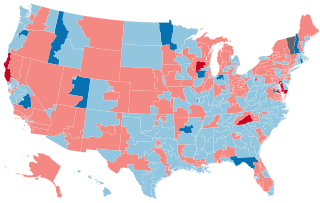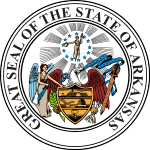
Joseph Taylor Robinson was an American politician who served as United States Senator from Arkansas from 1913 to 1937, serving for four years as Senate Majority Leader and ten as Minority Leader. A member of the Democratic Party, he previously served as the state's 23rd governor, and was also the Democratic vice presidential nominee in the 1928 presidential election.

The 1998 United States Senate elections were held on November 3, 1998, with the 34 seats of Class 3 contested in regular elections. This was seen as an even contest between the Republican Party and Democratic Party. While the Democrats had to defend more seats up for election, Republican attacks on the morality of President Bill Clinton failed to connect with voters and anticipated Republican gains did not materialize. The Republicans picked open seats up in Ohio and Kentucky and narrowly defeated Democratic incumbent Carol Moseley Braun, but these were cancelled out by the Democrats' gain of an open seat in Indiana and defeats of Republican Senators Al D'Amato and Lauch Faircloth. The balance of the Senate remained unchanged at 55–45 in favor of the Republicans.

The 1996 United States Senate elections were held on November 5, 1996, with the 33 seats of Class 2 contested in regular elections. Special elections were also held to fill vacancies. They coincided with the presidential election of the same year, in which Democrat Bill Clinton was re-elected president.

The 1968 United States Senate elections were elections for the United States Senate. Held on November 5, the 34 seats of Class 3 were contested in regular elections. They coincided with the presidential election of the same year. The Republicans picked up five net seats in the Senate. This saw Republicans win a Senate seat in Florida for the first time since Reconstruction.

The 1962 United States Senate elections was an election for the United States Senate. Held on November 6, the 34 seats of Class 3 were contested in regular elections. Special elections were also held to fill vacancies. They occurred in the middle of President John F. Kennedy's term. His Democratic Party made a net gain of four seats from the Republicans, increasing their control of the Senate to 68–32. However, this was reduced to 67–33 between the election and the next Congress, as on November 18, 1962, Democrat Dennis Chávez, who was not up for election that year, died. He was replaced on November 30, 1962, by Republican appointee Edwin L. Mechem. Additionally, Democrat Strom Thurmond became a Republican in 1964, further reducing Democrats to 66–34. This was the first time since 1932 that Democrats gained seats in this class of Senators.

The 1954 United States Senate elections was a midterm election in the first term of Dwight D. Eisenhower's presidency. The 32 Senate seats of Class 2 were contested in regular elections, and six special elections were held to fill vacancies. Eisenhower's Republican party lost a net of two seats to the Democratic opposition. This small change was just enough to give Democrats control of the chamber with the help of the Independent who at the start of this Congress in January 1955 agreed to caucus with them; he later officially joined the party in April 1955.

The 1932 United States Senate elections coincided with Democrat Franklin D. Roosevelt's landslide victory over incumbent Herbert Hoover in the presidential election. The 32 seats of Class 3 were contested in regular elections, and special elections were held to fill vacancies.

The 1990 United States House of Representatives elections was an election for the United States House of Representatives on November 6, 1990, to elect members to serve in the 102nd United States Congress. They occurred in the middle of President George H. W. Bush's term. As in most midterm elections, the president's Republican Party lost seats to the Democratic Party, slightly increasing the Democratic majority in the chamber. It was a rare instance, however, in which both major parties lost votes to third parties such as the Libertarian Party as well as independent candidates.

The 1912–13 United States Senate elections were held on various dates in various states. They were the last U.S. Senate elections before the ratification of the Seventeenth Amendment in 1913, establishing direct elections for all Senate seats. Senators had been primarily chosen by state legislatures. Senators were elected over a wide range of time throughout 1912 and 1913, and a seat may have been filled months late or remained vacant due to legislative deadlock. Some states elected their senators directly even before passage of Seventeenth Amendment. Oregon pioneered direct election and experimented with different measures over several years until it succeeded in 1907. Soon after, Nebraska followed suit and laid the foundation for other states to adopt measures reflecting the people's will. By 1912, as many as 29 states elected senators either as nominees of their party's primary or in conjunction with a general election.

The 2014 United States Senate elections were held on November 4, 2014. A total of 36 seats in the 100-member U.S. Senate were contested. 33 Class 2 seats were contested for regular 6-year terms to be served from January 3, 2015, to January 3, 2021, and 3 Class 3 seats were contested in special elections due to Senate vacancies. The elections marked 100 years of direct elections of U.S. senators. Going into the elections, 21 of the contested seats were held by the Democratic Party, while 15 were held by the Republican Party.

The 1998 United States Senate election in Arkansas was held on November 3, 1998. Incumbent Democratic Senator Dale Bumpers chose to retire instead of running for reelection to a fifth term. Making this was the first open seat with no incumbent held in this seat since the 1884 election. Democratic former U.S. Representative Blanche Lincoln won the open seat against Republican State Senator Fay Boozman. At 38, Lincoln was the youngest woman ever elected to the United States Senate. In 2010, Lincoln would lose re-election to a third term by Fay Boozman's brother, John Boozman.

Arkansas's 2010 general elections were held November 2, 2010. Primaries were held May 18, 2010 and runoffs, if necessary, were held November 23, 2010. Arkansas elected seven constitutional officers, 17 of 35 state senate seats, all 100 house seats and 28 district prosecuting attorneys, and voted on one constitutional amendment and one referred question. Non-partisan judicial elections were held the same day as the party primaries for four Supreme Court justices, four appeals circuit court judges, and eight district court judges.

The 2016 United States Senate elections were held on November 8, 2016. The presidential election, House elections, 14 gubernatorial elections, and many state and local elections were held concurrently. In the elections, 34 of the 100 seats—all Class 3 Senate seats—were contested in regular elections; the winners served 6-year terms until January 3, 2023. Class 3 was last up for election in 2010 when Republicans won a net gain of 6 seats.

The 2014 United States House of Representatives elections in Arkansas was held on Tuesday, November 4, 2014, to elect the four U.S. representatives from the state of Arkansas, one from each of the state's four congressional districts. The elections coincided with the elections of other federal and state offices, including the governor of Arkansas and a United States senator.

A general election was held in the U.S. state of Arkansas on November 4, 2014. All of Arkansas' executive officers were up for election as well as a United States Senate seat, and all of Arkansas' four seats in the United States House of Representatives. Primary elections were held on May 20, 2014, for offices that need to nominate candidates. Primary runoffs, necessary if no candidate wins a majority of the vote, were held on June 10, 2014.

The 2018 United States Senate election in Maryland took place on November 6, 2018, in order to elect a member of the United States Senate to represent the State of Maryland. It was held concurrently with other elections to the United States Senate, elections to the United States House of Representatives, and various state and local elections. Incumbent Democratic U.S. Senator Ben Cardin was re-elected to a third and ultimately final term by a landslide margin of almost 35 points, the largest margin in any election for this seat since Maryland began holding direct elections for Senate in 1913.

The 1924 United States Senate election in Arkansas took place on November 4, 1924. Incumbent Democratic Senator Joseph Taylor Robinson was re-elected to a third term in office over Republican Charles F. Cole.

The 1936 United States Senate election in Arkansas took place on November 3, 1936. Incumbent Democratic Senator and Senate Majority Leader Joseph T. Robinson was re-elected to a fifth term in office. He defeated two Democratic opponents in the primary election and then dispatched Republican G.C. Ledbetter in the general election.

The 1972 United States Senate election in South Dakota took place on November 7, 1972, concurrently with the U.S. presidential election as well as other elections to the United States Senate in other states as well as elections to the United States House of Representatives and various state and local elections.

The 1972 United States Senate election in West Virginia took place on November 7, 1972. West Virginia was one of fifteen states alongside Alabama, Arkansas, Colorado, Delaware, Georgia, Iowa, Louisiana, Maine, Minnesota, Mississippi, Montana, New Hampshire, Rhode Island and South Dakota that were won by Republican President Richard Nixon in 1972 that elected a Democrat to the United States Senate. Incumbent Democratic U.S. Senator Jennings Randolph was re-elected to a fourth term and a third full term defeating Louise Leonard in a landslide. This was the only United States Senate election in West Virginia that Jennings Randolph had won by more than 60% of the vote.






















